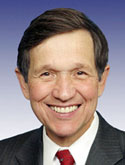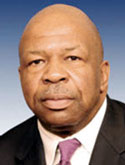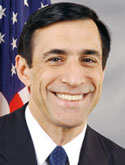
WASHINGTON (Capitol Hill) – During a recent congressional hearing, an outspoken Ohio Democrat accused Neel Kashkari, the assistant treasury secretary in charge of the $700 billion Wall Street bailout dubbed the Troubled Assets Recovery Plan, of overseeing a “classic bait and switch.”
Rep. Dennis Kucinich, chair of the House Committee on Oversight and Government Reform Nov. 14 questioned why the Treasury Department is “ignoring the congressional intent of TARP” to keep homeowners in their homes by purchasing troubled assets to prevent foreclosures.
Purchasing the bad assets and lifting the debt from bank balance sheets was supposed to make lenders more inclined to issue credit.
“Treasury cannot and will not make the effort to keep people in their homes,” said Rep. Kucinich. “It appears Sec. Paulson has gutted Section 109 of the Act (TARP). It is a policy reversal.”

He argued the intent of TARP was to prevent foreclosures. “The Treasury just basically cut that out of the act,” said the lawmaker.
The Treasury Department announced Nov. 12 that it was changing how $700 billion in taxpayer money was to be spent. The funds, which were approved by Congress, will now be used to invest into banks and other institutions that offer consumer credit rather than to purchase bad loans.
“As the markets rapidly deteriorated in October, it was clear to Sec. Paulson and Chairman Bernanke that the most timely, effective step to improve credit market conditions was to strengthen bank balance sheets quickly through direct purchases of equity in banks,” Mr. Kashari testified at the hearing.
“In early October, after consulting closely with Chairman Bernanke, Sec. Paulson explained that Treasury would use the financial rescue package granted by Congress to purchase equity directly from financial institutions–the fastest and most productive way to use our new authorities to help stabilize our financial system,” he said.
Rep. Elijah Cummings (D-Md.), a senior member of the House Committee on Oversight and Government Reform and the Congressional Black Caucus, was angry about how one firm was using money.

“Today’s news that AIG plans to pay out $503 million in deferred compensation is demonstrative of the type of mismanagement that led this company to its current situation in the first place. I believe that management at AIG could strongly benefit from learning some basic arithmetic,” he declared.
“CitiGroup just laid off 10,000 people. Morgan Stanley announced that it will lay off nearly 5,000. Twelve thousand to 13,000 employees at DHL will soon be unemployed.The list is nearly as long as the list of expenses on the invoices of AIG’s profligate spending,” the congressman said.
He added, “While the rest of the country is receiving pink slips for the holidays, AIG continues to dole out hundreds of millions of dollars even as it comes to the government, cashmere hat in hand, begging for more money.”
The hearing was heated at times with Mr. Kashkari having to explain why banks and other financial institutions are now Treasury’s focus instead of homeowners.
“With a stronger capital base, our banks will be more confident and better positioned to play their necessary role to support economic activity. Further in support of this goal, just two days ago, our banking regulators issued a statement underscoring the responsibility that banks have in the areas of lending, dividend and compensation policies, and foreclosure mitigation,” Mr. Kashkari testified.
“Treasury commends this action and believes it is critical to focus on the importance of prudent bank lending to restore our economic growth so that we do not repeat the poor lending practices that are a major cause of the current economic problems.”
The legislators were not convinced.
“Do you think Congress would have given you TARP if we knew you weren’t going to purchase troubled assets?” asked Rep. Kucinich.
Mr. Kashkari’s response was that the highest priority was preventing the failure of the banking system.
By reversing the decision to purchase troubled assets backed by failing mortgages, the Treasury Department has reneged on the promise to own those mortgages and allow people to stay in their houses by refinancing loans, said Mr. Kucinich.
“We got millions of people losing their homes,” Rep. Kucinich said sternly. “We got people holding on, hoping against hope … all of a sudden the Treasury sent the message to banks, forget about it, we’re going to give you the money you want.”
“You came to us saying that there was an immediate need to get rid of corrosive assets and buy a specific group of assets. You got the money and then did something else with it,” said Rep. Darrel Issa (R-Calif.).
“When did you hear money was going to be used for something else?” he said. “Was Congress lied to? Why is it hopeless to buy those assets when that’s the reason you came to us for the money?”
The change in focus received mixed reviews from community groups and activists.
“A month ago, Treasury Secretary Paulson told Congress and the American people that being able to purchase distressed assets from Wall Street was of such a high priority that the bailout had to be passed immediately and without major amendments.Just like Bush moved from weapons of mass destruction to spreading democracy as the rationale for invading Iraq, now Paulson declares he doesn’t need to use the bailout to buy distressed assets at all,” said ACORN National President Maude Hurd.
“This shows without a doubt that the tantrum thrown by the Bush administration to pass a Wall Street bailout without amendment or much debate was a theatrical and political act not borne of economic necessity whatsoever.”
The Wall Street Journal reported Nov. 14 that Sec. Paulson realized Sept. 29 that he would not use his $700 billion bailout plan for the rationale given Congress before the House passed and President Bush signed the legislation Oct. 3.
“Now that the bailout money won’t be wasted on a ‘Cash for Trash’ program for Wall Street, that money must go directly into stopping the foreclosure crisis that continues to drag down our whole economy and the global credit market,” said Ms. Hurd
“FDIC Chairman Sheila Bair has proposed using the authority granted in the $700 billion bailout to facilitate three million mortgage modifications to avoid foreclosure, which is a great starting template pending critical details,” said Ms. Hurd.
She added, “Only when we start stanching the record flow of foreclosures will we begin to stabilize housing prices and start to turn our economy around.”
While the bailout has only received the first half of the payment, a dissatisfied Congress could block release of the second half, $350 billion, and or put additional restrictions on how the Treasury Department uses it.












